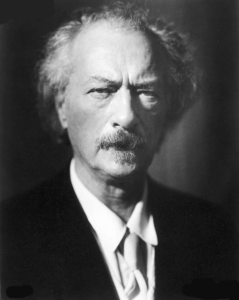Paderewski, Nocturne
 Ignacy Jan Paderewski (1860-1941) was one of the most celebrated concert pianists of his time. Born in Poland, which was then a part of the Russian Empire, he studied at the Warsaw Conservatory and took a teaching position there. He launched his concert career in 1887 and had immediate success. He toured widely, including some 30 American tours. He settled in California in 1913.
Ignacy Jan Paderewski (1860-1941) was one of the most celebrated concert pianists of his time. Born in Poland, which was then a part of the Russian Empire, he studied at the Warsaw Conservatory and took a teaching position there. He launched his concert career in 1887 and had immediate success. He toured widely, including some 30 American tours. He settled in California in 1913.
He also had a career in politics. He served briefly as Prime Minister of Poland in 1919 and represented Poland in negotiations over the Treaty of Versailles after World War I. Poland was then re-established as an independent nation after being partitioned by Russia, Prussia, and Austria-Hungary in the late 18th century. Paderewski’s leadership helped to solidify Poland’s status as an independent nation.
Although focused again on music between the two world wars, he also served as a cultural ambassador for Poland and used his international tours to raise awareness and funds for Polish causes. He resided principally in Switzerland. After the invasion of Poland by Germany and Russia in 1939, Paderewski again became a key leader in the Polish cause.
Paderewski’s compositions include two operas, a symphony entitled Polonia, a piano concerto, some songs, and various short works for piano, including the collection Miscellanea, Op. 16, which includes the nocturne featured here. Much of his music is based on Polish themes and his compositions are especially esteemed today in his native Poland.



